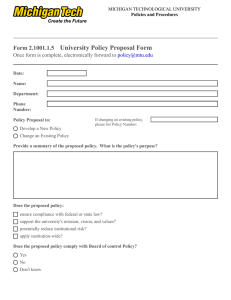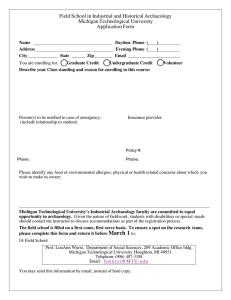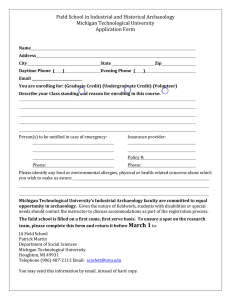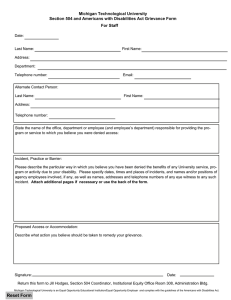Thomas A. Mitchell 122 Sill Hall
advertisement
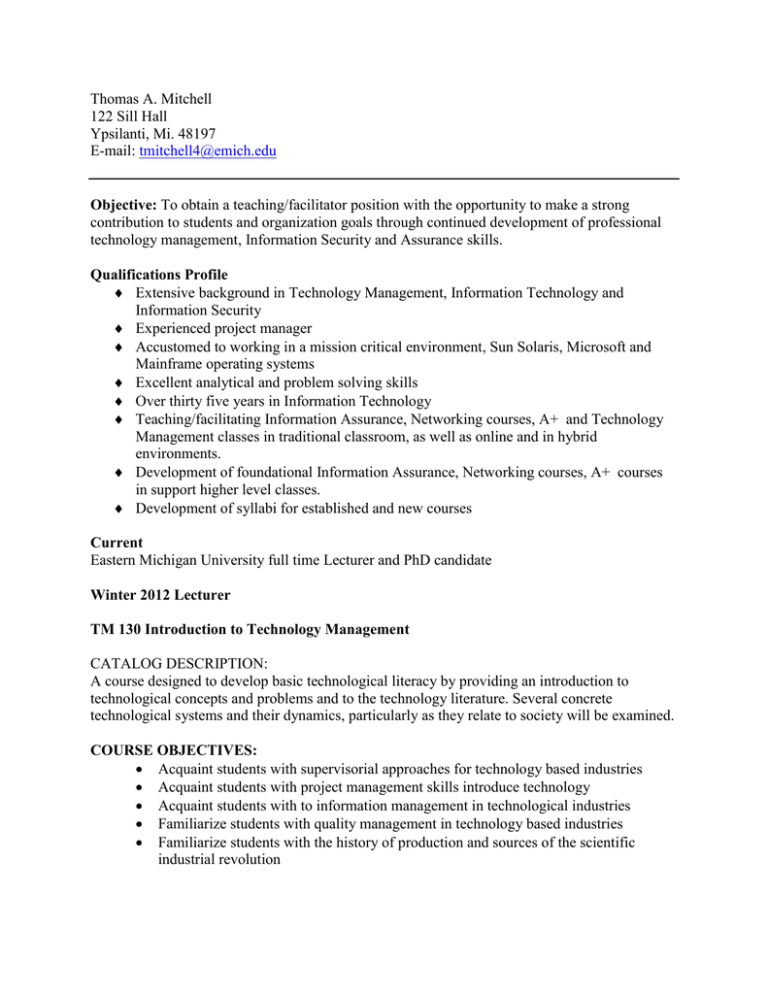
Thomas A. Mitchell 122 Sill Hall Ypsilanti, Mi. 48197 E-mail: tmitchell4@emich.edu Objective: To obtain a teaching/facilitator position with the opportunity to make a strong contribution to students and organization goals through continued development of professional technology management, Information Security and Assurance skills. Qualifications Profile Extensive background in Technology Management, Information Technology and Information Security Experienced project manager Accustomed to working in a mission critical environment, Sun Solaris, Microsoft and Mainframe operating systems Excellent analytical and problem solving skills Over thirty five years in Information Technology Teaching/facilitating Information Assurance, Networking courses, A+ and Technology Management classes in traditional classroom, as well as online and in hybrid environments. Development of foundational Information Assurance, Networking courses, A+ courses in support higher level classes. Development of syllabi for established and new courses Current Eastern Michigan University full time Lecturer and PhD candidate Winter 2012 Lecturer TM 130 Introduction to Technology Management CATALOG DESCRIPTION: A course designed to develop basic technological literacy by providing an introduction to technological concepts and problems and to the technology literature. Several concrete technological systems and their dynamics, particularly as they relate to society will be examined. COURSE OBJECTIVES: Acquaint students with supervisorial approaches for technology based industries Acquaint students with project management skills introduce technology Acquaint students with to information management in technological industries Familiarize students with quality management in technology based industries Familiarize students with the history of production and sources of the scientific industrial revolution Familiarize students with the history of human capital impacts in technology based organizations TM 212 - The Management of Technological Change CATALOG DESCRIPTION: The implementation of new technology within organizations often requires substantial changes in organizational, group and individual work processes. This course will present change frameworks that enhance the effectiveness and efficiency of technology change and implementation. It will integrate materials from several disciplines including organizational development, management, industrial engineering and organizational science. COURSE OBJECTIVES: Examine the rationale behind the push for technological innovation and technology adoption Develop skills and knowledge needed to select appropriate technologies and oversee their operation. Examine the socio-technical systems (STS) is both a theory and methodology for integrating the technical and human/organization sides of an organization. Examine how to assess whether technology (or any organizational change) is needed to improve performance, and how to determine whether the people and infrastructure are adequately prepared for the change. Examine how to develop and design training program, and presents examples of successful training outcomes using the strategic partnership approach. IA103 Information Security/Assurance Overview A study of security in both the voice and data networks and an examination of the security issues associated with the movement toward a convergence of the two infrastructures. Topics to be covered include voice and data network connectivity, modem security, VOIP security, wireless security, cryptography, intrusion detection systems, voice and data firewalls, malicious software, information operations and warfare, and denial of service attacks. Course Objectives: Demonstrate foundation knowledge of information security/assurance within the organization Demonstrate knowledge of the profession, its organizations, goals and leadership roles, literature/publications, issues, and research foundations. Demonstrate knowledge of the foundations of information security including legal, regulatory and policy issues, understanding general threats against information systems including denial of service, spoofing, and hijacking. Understand how to combat viruses, worms, Trojan horses and logic bombs. Demonstrate knowledge of security objectives and policy development. Demonstrate knowledge of cryptography and public key infrastructure (PKI) Demonstrate knowledge of target hardening of network devices, operating systems and applications. IA210 Concepts of Network and Business Technology A study of the foundational concepts, functions of networks and related business technology. The course emphasizes high level concepts about administration of client/severer and peer-topeer networks. This course first introduces the fundamental building blocks that form a modern network, such as protocols, topologies, hardware, and network operating systems. The course includes exposure to equipment, procedures and discusses career opportunities. Course Objectives: Demonstrate foundational knowledge networked computing Demonstrate foundational knowledge network security, integrity and availability Demonstrate foundational knowledge of the OSI model and each of its layers Demonstrate foundational knowledge of the foundation for LANs, MAN’s, and WANs, Demonstrate foundational knowledge of the WLAN (wireless LAN) architecture Demonstrate foundational knowledge of the characteristics common to all NOSs (network operating systems) Demonstrate foundational knowledge of network security and how to minimize risks Demonstrate foundational knowledge how to network data safe from loss or damage Prior EMU Experiences Resource 25 Resource Coordinator The R25 Resource Coordinator serves as the administrative presence for academic space management and serves as the functional administrator for the university classroom scheduling software. The primary responsibility for this position includes resolving space utilization issues, updated the R25 database, maintaining the EMU R25 website ESSENTIAL DUTIES: Working with college, department, and school schedulers, manage and maintain an accurate database inventory of all instructional space, and instructional room specifications which could be utilized for any academic events which require campus resources. Work with college, department, and school schedulers to determine R25 implementation strategies, integrating conceptual event (classes) planning process within the technological capabilities of the R25 application. Develop processes by which campus community can request changes and report problems with academic spaces housed in the R25 database. Support development of protocols for communicating and documenting changes to academic spaces. Provide support for the course planning and resource utilization. Research and evaluate solutions to problems, challenges in the R25 program, identify actions to be taken, make appropriate recommendations and implementing solutions as required or directed. Review, evaluate and resolved moderate database issues. Monitor, analyze and verify data to ensure data integrity. Design, create and implement webpage for R25 resources. Adjunct/Lecturer/Instructor/Facilitator Spring 2006 Fall 2006 Multidisc Seminar Tech INDT-601-0 EMU Eagle Crest facilities. Contemporary Issues in Technology INDT-602-0 Understanding Technology INDT-150-14 Winter 2007 Solving Quantitative Problem Technology STS-224-0 Understanding Technology INDT-150-019 classroom Fall 2007 End-User Systems: Planning & Design NITA-422-000 classroom Solving Quantitative Problems Technology STS-224-000 classroom Winter 2008 Microcomputer Application in Technology STS-201-007 classroom Spring 2008 Microcomputer Application in Technology STS-201-007 online Summer 2008 Microcomputer Application in Technology STS-201-007 online Fall 2008 Microcomputer Application in Technology STS-201-007 classroom Spring 2009 Solving Quantitative Problems Technology STS-224-000 online Fall 2010 Information Security Overview IA103 Introduction to Technology Mgt TM 130 online Mgmt of Technological Change TM 212 System support & troubleshoot IA 215 Winter 2010 Information Security Overview IA103 Introduction to Technology Mgt TM 130 online Mgmt of Technological Change TM 212 Hybrid System support & troubleshoot IA 215 Spring 2010 Information Security Overview IA 103 Summer 2010 Concepts of Networks and Bus Tech IA 210 Fall 2011 Information Security Overview IA 103 Introduction to Technology Mgt TM 130 Hybrid Concepts of Networks and Bus Tech IA 210 Winter 2012 Information Security Overview IA 103 Introduction to Technology Mgt TM 130 online Concepts of Networks and Bus Tech IA 210 Mgmt of Technological Change TM 212 online Past Course Experiences: INDT 150 Introductions to Technology A course designed to develop basic technological literacy by providing an introduction to technological concepts and problems and to the technology literature. Several concrete technological systems and their dynamics, particularly as they relate to society will be examined. INDT 601 Multidisciplinary Seminars in Technology "Life after Hydrocarbons" The series explored ways Americans can reduce their dependence on hydrocarbons, which are refined at oil refineries and processed at chemical plants, and look at alternative fuel sources. During the series, participants heard about alternative energy options and opinions from experts. Speakers explained the driving need for fuel alternatives; describe the alternatives and the tradeoffs of each. Designed, created and implemented this very powerful and successful series, accomplished with zero budgets. • • • • • • • • May 17 The State of Nuclear Energy. Today Mike Trapp DTE Energy May 24 Bio Mass in Housing and Transportation. Chris Schilling, Ph.D. Charles J. Strosacker, Chair and Professor of Engineering Department of Mechanical Engineering, Saginaw Valley State University May 31 The Power of the Wind. John D. Wolar, President and Chief Executive Officer Founder and president of Alternate Energy Solutions, Inc., June 7 Solar Energy and Hydrogen Fuel for Structures. Stanford R. Ovshinsky is President and Chief Scientist and Technologist of Energy Conversion Devices, Inc. June 14 The Ann Arbor Green Energy Challenge - 30% renewable energy for all municipal operations by 2010 Dave Konkle of the City of Ann Arbor Energy Office INDT 602 Contemporary Issues in Technology A seminar style graduate course taking up the most current issues and thinking regarding the implications of information technology in society. NITA-422-000 End-User Systems: Planning & Design Course Description: (I designed 100%) This course focuses on planning and designing end-user systems that deliver information services and resources. Emphasis is on end-user needs assessment, alternative system designs, security planning, support issues, and training and development. Topics include analyzing the business case, requirements modeling, enterprise modeling and development strategies. Students also learn about data design, the user interface, input and output design, system architecture, systems implementation and systems operations and support. Students will develop a proposal for a new or revised end-user system that reflects the principles covered in the course. Purpose: The purpose of this course is to provide undergraduate level students with an educational experience in the application of Systems Analysis techniques to Network and Information Security projects. The student will apply theory and principles to network security policy, information systems computer and network facilities, and the life cycle development process. Scope: The scope of the material to be covered includes the demonstrate knowledge of the principles and practices of the following information technology disciplines: • Information security • Business communication • End user needs assessment • • • • Technology support best practice Disaster recovery and business continuity Information technology measuring, reporting and controlling Information technology strategy Course Objectives: Upon successful completion of this course, students will be able to: • • • • • • • • • • • • • • • • • • • • • • Describe the fundamental systems development life cycle Recognize the various roles on a project team Create a system request Assess technical, economic and organizational feasibility Perform a feasibility analysis Create a project work plan Use techniques for staffing a project Recognize how to reduce risk on an Information Assurance project Recognize when to use various business process analysis strategies Use various methods for gathering information Create Data Flow Diagrams Create Entity Relationship Diagrams Develop a design plan using appropriate design strategies Differentiate between server-based, client-based and client-server base computing Create a network model Develop hardware and software specifications Create an information security plan to protect data in various forms Design user interfaces using proper design principles Write program specifications Create a structure chart Develop documentation Develop a Change Management plan IA215 A study mapped toward CompTIA’s A+ Exam objectives. Provide a significant portion of the foundational knowledge that prepares students to take the CompTIA’s A+ Essentials certification exam (220-701, 220-702). PC Technician Essentials, Motherboards, Processors, and Adapter Cards, BIOS, Power Supplies and System Cooling, RAM, I/O and Multimedia Ports and Devices, Video Displays and Graphics Cards, Laptops and Portable Devices, Security, Printers, Storage Devices, Using and Managing Windows, Installing and Upgrading Windows Operating Systems, Troubleshooting and Maintaining Windows, Networking, and Safety and Environmental Issues. This course is focused on learning the fundamentals of supporting and troubleshooting computer hardware. At the same time, it prepares students to successfully pass the A+ 220-701 and 220-702 exams. Students will be instructed via theory and practical pedagogy in the world of PC hardware support. Course Objectives: Identify PC hardware components Outline relationship between hardware and software Articulate form factors used for computer cases, motherboards, and power supplies Explain how electricity is measured and about electrical components Analyze and evaluate multiple hardware solutions to computing problems Solve A+ level certification knowledge based questions STS 150 - Understanding Technology CATALOG DESCRIPTION: An introduction to the discipline of technology focusing on technological concepts and problems. Several technological systems and their dynamics, particularly as they relate to global issues and culture, will be examined. COURSE OBJECTIVES: Acquaint students with the major technologies affecting our culture and the global environment, and how technology shapes our world. Acquaint students with the human impact of technologies, including their moral, social, economic, legal and political consequences. Examine and understand technology and its impact on student’s life and society. Acquaint student with several forms of technology. Examine technological systems and their dynamics as they relate to social, economic, political, and moral issues STS 201 Microcomputer Applications in Technology This course utilized various applications based on microcomputers and includes a section online. The use of technology, computers and understanding their applications and the Internet is critical in today social. Course Description: This course is an introduction to the technology of microcomputers and how various applications are used to increase productivity. The course was created originally by John Preston, and modified with permission. This course contains an introduction to computers, word processing, spreadsheets, database management, presentations, email, Internet and other computer based applications. Microsoft as well as Apple, Sun, Google, IBM and Open-System applications were investigated and utilized to solve every day problems as well as complex challenges. Traditional classroom and online The course was created by John and Sally Preston, modified with permission. STS 224: Solving Quantitative Problems in Technology STS 224 demonstrates the importance of bringing mathematics and information technology together to solve problems that are encountered in virtually every person's career. College graduates are expected to take leadership roles in business, community activities, and other organizations. These responsibilities include managing budgets, collecting and analyzing data on the condition of the organization, and making proposals for action based on interpretation of the data. This requires the ability to apply principles of quantitative reasoning and to utilize technological tools such as computer spreadsheets. In STS 224, students learn to recognize the assumptions made when gathering data and how to choose a model that utilizes the appropriate mathematical, algebraic, geometric, probabilistic, or statistical functions and design a spreadsheet to calculate a solution. Students learn to use the rapid recalculation capabilities of a spreadsheet to compare scenarios, project trends, and make predictions while allowing for the inherent limitations of the model. People in positions of responsibility must report to committees, boards, and the public at meetings. In STS 224, students learn to display the results of their analysis in graphical form using the extensive library of spreadsheet tools for charting data including trend lines, and annotated charts. STS224 is a valuable course for all college graduates who aspire to positions of leadership in their organizations or communities. Traditional classroom and online The course was created by John and Sally Preston, modified with permission. STS Departmental Program Review Resource Coordinator Assist faculty with the lengthy detailed program review process and help with resources. MS Operations Coordinator Graduate Assistant to Dr. Denise Pilato and Dr. Al Bellamy MS, Co-Directors of the School of Technology Studies masters program. Job functions: to assist with graduate admission process into the various programs within the department and to ensure proper credentials and criteria are met; to research and assist in the resolution of issues and problems associated with past and/or current grades; to assist in the successful graduation audit process to ensure students graduate on time with the proper credentials; to assist any student or staff in problem resolution; to help and assist students with processes and procedures to ensure successful completion of classes in a timely manner; assist in the promotion of the MS program; development of new Program of Study (POS) forms and one page flyer’s describing programs. IC3 Testing Coordinator The Internet and Computing Core Certification (IC³) program is the world's first validated, standards-based training and certification program for basic computing and Internet knowledge and skills. Successful completion of IC³ ensures you have the knowledge and skills required for basic use of computer hardware, software, networks, and the Internet. IC³ 2005 Standard (Complete Objectives) IC³ — Computing Fundamentals IC³ — Key Applications IC³ — Living Online Successful completion of the three exams can be used in place of BMMT 201 and STS 201 http://info.certiport.com/yourpersonalpath/ic3Certification/ Teaching Assistant INDT 500 History of Technology with Dr. Denise Pilato INDT 602 Contemporary Issues in Technology with Dr. Morell Boone. INDT 601 Multidisciplinary Seminars in Technology “Electronic information and its challenges” with Dr. Ron Westrum Accomplishments On committee that successfully managed the change the Master of Liberal Science degree to a Master of Science in Technology Studies. On International Students Committee which promotes the unique value of students who are attending EMU. I have been a past member of the graduate council as a student representative, rarely missing a meeting. Worked with Dr. Morell Boone to create an Ireland cultural exchange class offered June 2007, where fifteen students went to Cork and Dublin Ireland. Worked on quality board with Program Management team to improve the quality and ease of use of Program Review. Special invitation to present “How new technologies, such as smart phones, iPad, search engines, etc., might make academic research easier or more difficult in the future, accentuating the positive and exciting aspect of preparing for graduate school” at the McNair Scholars Program conference: "Designing Your Future, Embracing Your Past: Encouraging Excellence in Research," on Saturday, April 9th, 2011. Degrees: BS Technology Management, 2004, Eastern Michigan University, Honors MLS Information Security, 2005, Eastern Michigan University, Honors PhD in Information Technology and Assurance (in progress), Eastern Michigan University, in progress Research Interests: Information Security and Assurance as applied to online learning. Validation and confirmation of students, online testing and verifying credentials of who are the real students online? Currently pursuing a PhD at EMU “Faculty Espousal and Exploitation of Podcasts". Interested in research and application of technology as it applies toward education. Specifically: how the Internet keeps changing how we learn, work and play, how to keep it safe, our data safe, our students safe while working in a highly volatile unsafe environment. Prior EMU Experience Fujitsu Computer Systems (formerly Amdahl Corporation) Southfield MI 1983 - 2002 Customer Service Manager (three states and twenty international countries) 1998- 2002 Michigan and Ohio Team Leader of three teams from 1994 to 1998 Account Representative 1986 and 1994 Senior Systems Field Engineer 1983 to 1986 Customer Service Manager • Managed complex IT projects while consistently exceeding customer expectations for information systems project planning at sites located in Michigan, Ohio, Indiana and twenty international sites located in Canada, Europe, South America, Argentina, Italy, Japan, China, Brazil, Argentina, France, Sweden, Taiwan, and Germany. • Outstanding resource management, controlling inventory, billings, contracts, service renewals, and service upgrades across the region. • Project management and team coordination for complex IT projects from conception to production at various customers sites throughout Michigan. • Demonstrated effective management and leaderships skills, with a track record of mentoring and developing staff comprised of a variety of professional skills and backgrounds to support system development, system integration and service for customers located at locations across the mid-west states, including Michigan, Ohio, Pittsburgh, PA., and Lexington, KY areas. • Managed and coordinated 24/7 mission critical customer service and problem resolution. • Able to met critical deadlines under pressure in a timely manner supporting Fujitsu, Amdahl, IBM and Sun Microsystems equipment. Exceeding all requirements and achieving many awards. • Strong interpersonal and communications skills, specifically listening and presentation skills. • Managed and coordinated the maintenance, installation and configuration for Amdahl sold Sun Microsystems equipment, installed at various DaimlerChrysler locations in the USA and around the world Senior Systems Field Engineer • Sun equipment • Sun Solaris • Fujitsu server and mainframe equipment • Fujitsu Linux • Microsoft Server • Amdahl Mainframe and peripheral equipment Awards • Recognition of an extraordinary effort toward Quality Improvement • 1983, 1988 and in 1998 Elected by peers to attend Field Business conference • 1994-1998 Elected by peers to be Team Leader. First one team, then of two teams, finally three teams simultaneously, unprecedented. • Many testimonials from customers attesting to excellent outstanding work. Magnuson Computer Systems • • Regional Specialist 1979-1983 Five state regional responsibility, providing expert technical training, repair, and technical support for Magnuson M30, M31, M40, M42 CPU’s mainframe (IBM compatible) CPU's. Specialized in Magnuson CPU's as troubleshooter, resolving Input/Output problems. National Advance Systems (Itel was bought out by National Advance Systems) • Field Engineer Itel Corp • Field Engineer 1978 - 1979 1997 - 1978 Military Service U.S. Air Force four years honorable discharge Flight Simulator Technician / Sergeant 1973 - 1977 • Xerox, Raytheon and Sigma 5 computers. • Promoted early to Senior Airman, besting 350 other applicants all over the U.S.to be #1 Security Clearance Information Top Secret security clearance during active duty with U.S. Air Force Education Eastern Michigan University current PhD candidate fellowship concentration in Information Assurance and Education Eastern Michigan University – May 2004 – June 2005 Masters degree with a concentration in information security. The program includes training and education about HIPAA, Sarbanes-Oxley Act, Graham-Leach-Bliley Compliance, 21CFRpart11, ISO 9000 & ISO 9001, information security policies, computer and network security, security for systems administrators, physical security requirements, administrative security procedures, information security audits, and information security vulnerability risk. GPA 4.0 Honors •2005 inducted into EPT Epsilon Pi Tau, International Honor Society for Professionals in Technology. •2006 inducted into the Phi Kappa Phi Honor Society. •Past recipient of Academic Excellence; Honors; and Outstanding Graduate Awards. Eastern Michigan University – Bachelor of Sciences in Technology Management April 2004. Major: Technology Management. GPA 3.8 On Deans list every semester University of Phoenix, Business Mgt., April 2001 to September 2002 GPA 4.0 Washtenaw Community College, Ann Arbor, MI, 1979 to 1981 Liberal Arts (Later transferred to Eastern Michigan University) State University of New York, Plattsburgh, NY, Fall 1975 to 1977 Computer Science & Liberal Arts University of Detroit, Detroit, MI, Fall 1972 to 1973 Engineering Professional and Technical Training Career Leadership: “Managing Your Career” Basic Principles for a Collaborative Workplace Personal Strategies for Navigating Change Managing within the Law (for Managers) The Business Impact of Diversity Finance for Managers and Project Managers Project Management I Situational Leadership Selling to Business Needs Microsoft Word Microsoft Project Microsoft Excel Microsoft PowerPoint Project Management II Professional Organizations PMI Project Management Institute (National) PMI Project Management Institute / Michigan Huron Valley Chapter InfraGard: InfraGard is an association of businesses, academic institutions, state and local law enforcement agencies, and other participants dedicated to sharing information and intelligence to prevent hostile acts against the United States. InfraGard Chapters are geographically linked with FBI Field Office territories. HASTAC ("haystack") is a network of individuals and institutions inspired by the possibilities that new technologies offer us for shaping how we learn, teach, communicate, create, and organize our local and global communities. Member of Android Developers group
